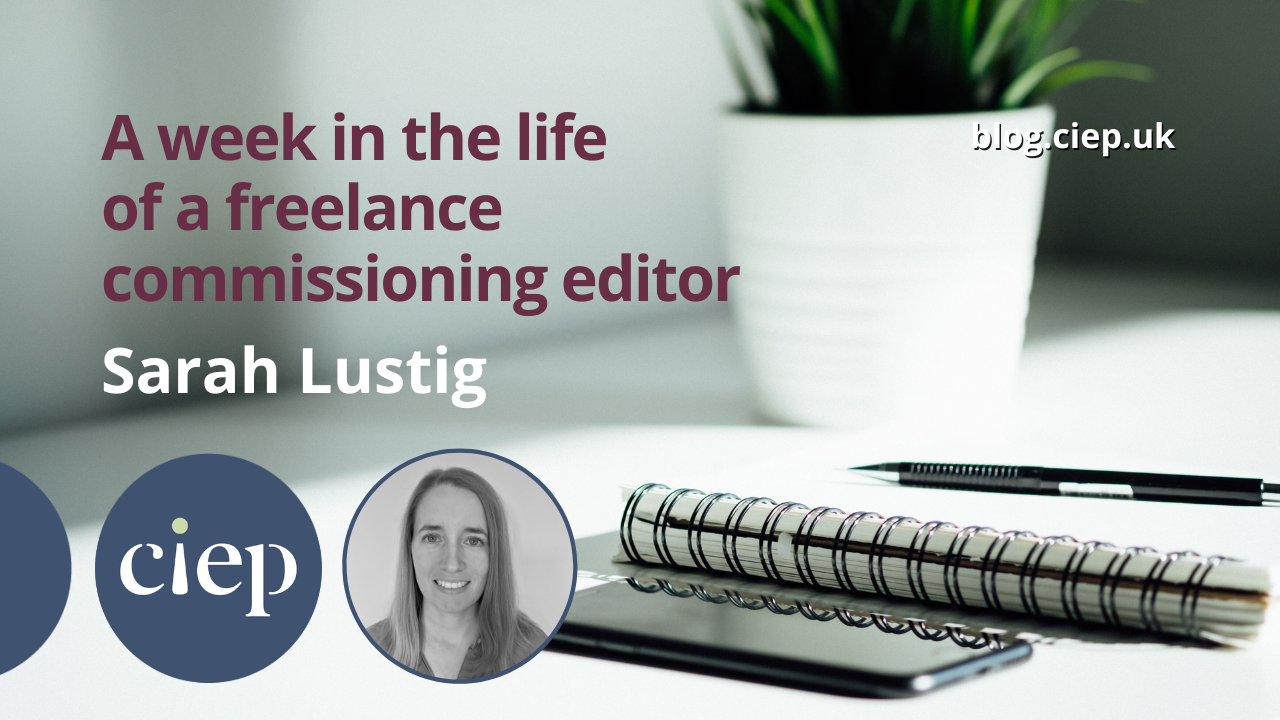If you’ve ever wondered what a freelance commissioning editor gets up to, in this post Sarah Lustig has provided some answers!
I work as a freelance commissioning editor for several different educational publishers. Before starting my business, I worked in-house for a large educational publisher. I had a lot of experience as a project manager, but almost none as a commissioning editor.
Slowly, project management jobs morphed into commissioning (sometimes by way of nebulous ‘author management’). Before I knew it, I was overseeing large multi-component courses. Now it’s a core part of my services. My in-house experience was with international curricula and I still do a lot of work on them now, as well as occasional UK and vocational titles.
Before I go into what a typical week might look like, let’s clear up some confusions around the work of a commissioning editor.
How is it different from project management?
In many ways, it isn’t. The work of the commissioning editor is largely the same as that of the project manager, which is why my project management skills helped me segue so neatly into commissioning.
The key distinguishing feature of the commissioning editor’s work is that it centres on the early development of the content. A project manager (PM) may take over later. The handover to the PM often happens after any manuscript development has been completed and the materials are ready for copyediting. In that case, the freelance commissioning editor may stay on the project, but in a reduced role, or they may hand over to an in-house colleague.
In the same way that a designer maintains a key relationship with their illustrators, the commissioning editor takes ownership of the relationship with any authors. Throughout the project, they are the author’s first point of contact. In some cases, all author queries go through the commissioning editor and the rest of the team has little to no contact with them.
The commissioning editor also has overall responsibility for the project; team members (including the PM) will escalate issues to the commissioning editor, who makes a decision on how to address them. For that reason, freelance commissioning editors may work very closely with an in-house team member, such as a publisher. A freelancer can reasonably make decisions about text features or style, but they probably cannot make business-critical decisions, such as a decision to delay publication if there is an urgent issue with the content.
Back to a typical week: let’s assume I’m at the start of a new project. What would my week involve?
Commissioning authors
One key task of the commissioning editor is to commission the authors to write the content. The commissioning editor might choose them from contacts the publisher has supplied, from their own list of contacts or by sourcing someone new through sites such as LinkedIn.
At the start of a new project, I compose a standard email to send out to prospective authors. It will include:
- Details of the project.
- The schedule.
- The remuneration being offered (if known at this stage).
Depending on how urgently we need to find someone, I might email several people simultaneously (and explain that in the email). Otherwise I approach one or two people and wait for their responses.
A typical week might include a phone call with a new author who has questions about the project. Some prefer to iron out any questions over email, but a phone call can be especially useful if you do go on to work together on the project.
Author briefing
While I am approaching potential authors and waiting for replies, I also start drafting the author briefing document. The publisher may have a template that they ask me to work from. If not, I have my own template that I adapt. The brief always includes:
- A project overview and contents list for the proposed publication.
- Any series features.
- Special requirements.
- Rights and permissions guidelines – the publisher usually supplies some standard wording; I add to that any artwork and/or photo budgets.
- Workflow and contacts.
The author briefing can be an exciting part of the job. It’s often one of the most creative tasks. It’s at this stage that the vision for the product is laid out. Will you add any new features? How will you address a unique requirement from the subject specification, such as scientific practicals or field work?
This brief is a really important part of the project materials. It will be used by several other team members to get to grips with the expected content. It might also be used in briefing freelancers later down the line.
Another key task of the commissioning editor is to check that the material submitted by the author matches the brief. Some small variances are normal and can be resolved during development editing. But it’s more troubling if the author has not submitted a section or has not briefed any photos, in a brief that asks for 100 photos.
Liaising with reviewers and development editors
After the author has submitted their manuscript, it may go to reviewers or a development editor to check. Often, the commissioning editor will commission and brief any reviewers or development editors, in the same way they did with the authors. They will also liaise with them throughout their work.
Since the work of these freelancers is necessarily in-depth, there are likely to be content amendments to the text and author queries. In a normal week, I might receive some of these comments back from the freelancers. I go through them to see if there are any simple issues I can resolve myself in the manuscript – a question about the grammatical style used or a simple error found. I then send everything else back to the author to work on.
There may be some work to do between the author and the reviewer or development editor, to agree on the best solution to a problem. As commissioning editor, I have the ultimate decision-making responsibility in any disagreements. They don’t happen very often. Usually I can defer to the author.
Team meetings
Part of the commissioning editor’s role is to attend – and sometimes run – team meetings. These meetings could include a project kick-off and regular team update meetings. The commissioning editor usually runs the project kick-off. This is a time for them to brief the rest of the team on the project.
In most weeks, it’s likely that I will attend an update meeting with the team. Early in the project, when the manuscript is with me, I use the team meeting to tell others what the author has delivered and the progress of any editorial work, such as development editing.
Later, when the manuscript has passed to a project editor, the project editor or project manager will provide the team with updates. At that stage, my role in the meeting is mostly to answer any queries.
I might also be called on to make decisions when there is a problem. For example, the typesetter has been delayed and won’t return the proofs on the agreed date. Can we afford to delay the schedule? If we delay now, can we save time later on? Do we want to batch the content to keep it moving? A project manager will advise on all these points but often the commissioning editor will decide what course of action to take. A wise commissioning editor listens to the project manager’s suggestion.
The rewards and the challenges
I find commissioning work very rewarding. I’m there at the very beginning of the project, when the concept is still being scoped out. I then get to see the vision realised in the final product.
It can be very challenging, especially when there are problems and I need to try to provide solutions and answers. Sometimes the problem-solving itself is a good challenge; sometimes it isn’t. However, for me, the satisfaction of seeing something develop from nothing, until it’s a real product out in the world, outweighs the difficulties.
About Sarah Lustig
 Sarah Lustig has been working in educational publishing since 2010. She has been freelance since 2014, providing educational publishers with proofreading, commissioning and project management services. She specialises in international curricula, as well as some non-fiction subjects. She is also the author of the middle-grade novel Mystery in the Palace of Westminster.
Sarah Lustig has been working in educational publishing since 2010. She has been freelance since 2014, providing educational publishers with proofreading, commissioning and project management services. She specialises in international curricula, as well as some non-fiction subjects. She is also the author of the middle-grade novel Mystery in the Palace of Westminster.
 About the CIEP
About the CIEP
The Chartered Institute of Editing and Proofreading (CIEP) is a non-profit body promoting excellence in English language editing. We set and demonstrate editorial standards, and we are a community, training hub and support network for editorial professionals – the people who work to make text accurate, clear and fit for purpose.
Find out more about:
Photo credits: office desk by Dose Media on Unsplash; phone call by Marcus Aurelius on Pexels; team meeting by Headway on Unsplash.
Posted by Sue McLoughlin, blog assistant.
The views expressed here do not necessarily reflect those of the CIEP.



